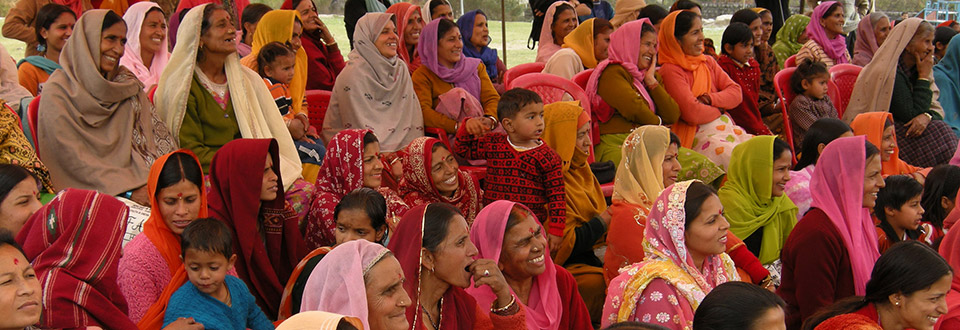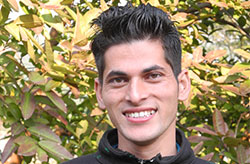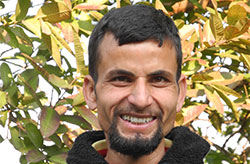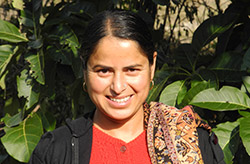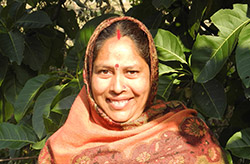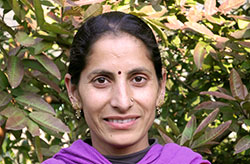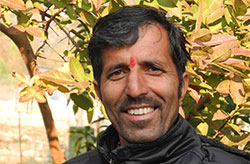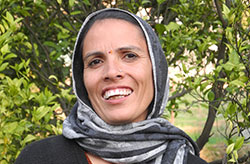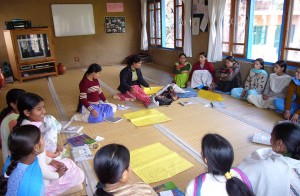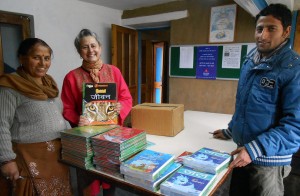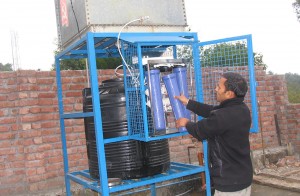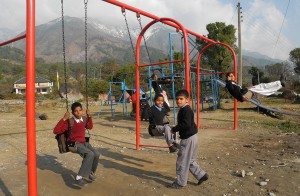The Sidhbari area has a population of round 5,000 farmers, shepherds and labourers. There is still a high level of illiteracy and poverty. Until recently, when the slate mines were closed, they would supplement the meagre returns from small scale farming by working in the mines. Now the men travel further seeking labouring work which exacerbates the endemic problems of drinking and gambling and places considerable economic and social strain on the families.
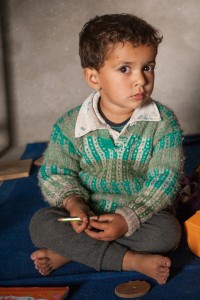 Women and children particularly suffer due to social constraints, hard work, childbearing/rearing and other family responsibilities. Whilst the men and boys are able to go out to work, unless they are attending school or college, girls are discouraged from going out and taking jobs and are therefore confined to the home. Society strongly favours the boy child, whilst a girl is regarded as a misfortune and a drain on the family. Traditional marriage customs dictate that girls are married away from their families, loosening links with childhood girlfriends and family members, and placing them in an insecure and vulnerable position in the husband’s family. When widowed they are considered bad luck and are therefore looked down on.
Women and children particularly suffer due to social constraints, hard work, childbearing/rearing and other family responsibilities. Whilst the men and boys are able to go out to work, unless they are attending school or college, girls are discouraged from going out and taking jobs and are therefore confined to the home. Society strongly favours the boy child, whilst a girl is regarded as a misfortune and a drain on the family. Traditional marriage customs dictate that girls are married away from their families, loosening links with childhood girlfriends and family members, and placing them in an insecure and vulnerable position in the husband’s family. When widowed they are considered bad luck and are therefore looked down on.
Consequently women are often the victims of emotional and sexual violence, both within their own families and if they go outside to work. In a culture in which women are blamed for causing a man to abuse them, they get little support whatever age they are. This can then lead to a sense of helplessness and lack of pleasure in their lives – which in turn can give rise to depression, anxiety, psychosomatic illnesses and other emotionally-based conditions. Single Women, a category that includes all women who live outside the norm of marriage whether widowed, divorced, abandoned or never-married women are particularly at risk in this society. The main task of women in India is to get married, produce children (preferably male) and nurture the family. If a wife loses her husband through death or abandonment, it is considered her fault and she is socially de-valued. If she leaves him, by casting off her role as a wife she is considered dangerous to society. Equally, society considers that a woman who fails or elects not to get married is very strange and the object of scornful curiosity. These are traditional views commonly held, not only in village society but also in many urban, even educated communities and they impact enormously to reduce women’s capability and strength.
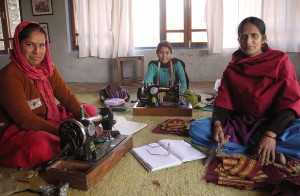
Rakkar Women’s Self-Employment Group use the Community Centre workshop for their bag making project. To learn more, please click here.
Single Women and wives of alcoholics or disabled men all tend to experience significant economic difficulties. Nishtha encourages income generation through self help projects and provides training such as in massage (which is an acceptable way for a woman to make a little money in the village), sewing and embroidery to provide the skills needed to set up small scale projects.
Young women are another vulnerable group who, despite increasing access to education continue to be subject to arranged marriages As almost all married women leave their natal home and reside with their husband and his family, a newly married woman is cut off from her support system, friends and family, and is thrust into the most vulnerable position that she will likely experience in her life. She is confined to the home and the family fields, and it often takes years for her to develop her own support system in her husband’s community.
Young boys too experience tremendous stress in teenage, when they struggle to reconcile the ever increasing differences between them and their parents in what they expect out of life. The incidence of alcoholism, drug abuse and suicides in young people is increasing as they see little hope of fulfilling their own or their parents’ ambitions in this highly competitive society. Arranged “in caste” marriages, lack of earning opportunities even with high educational achievements, and their feelings of frustration at not being able to live the good life as shown on the TV and in films, all contribute to creating problems for young people in our area.
Nishtha Community Centre
In 2002 we purchased the house next to the health clinic which was simply built and in poor condition from a family who wished to move to the Punjab. Extensive repairs and improvements were undertaken during 2003-4 including strengthening the foundations, raising a support structure for a second floor, roofing the entire structure to save the leaking concrete flat roof from water damage and repairing the walls. The original look of local Khanyara stone work and mud rendering has been maintained along with a slate and bamboo roof and simple wooden flooring. The courtyard area is paved with local heavy slate chakkas providing an area to sit and the back garden has been landscaped to provide an area for events and functions. Since 2004 Nishtha Community Centre has offered the community a wide range of vibrant activities.
We are very grateful to the German Embassy in New Delhi for funding the repairs and improvements to the Community Centre and to the Australian Embassy for assisting us in launching our community programmes.
Community Centre Staff and Facilities
The Community Centre facilities
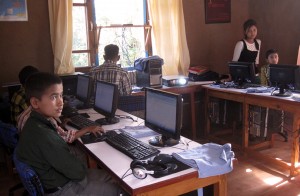
The computer room, set up with 7 up to date computers in which computer training classes are held every day.
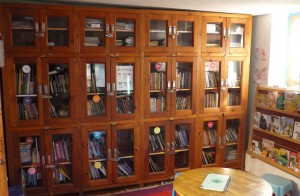
The Community library, a child welcoming space with easy access to over 1,000 books, primarily in Hindi
Residential facilities for visiting doctors, resource people, volunteers or special needs cases.
Functional kitchens provide space for tea, snacks and large quantities of food to be cooked and the school children or groups of people to be fed on the ground behind the centre on the covered verandas when it is raining.
Bathrooms with solar heated hot water and provision for handicapped people.
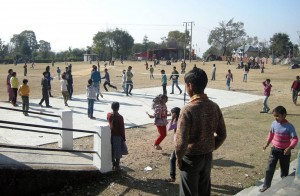 Nishtha Sports Ground Rakkar village ground used to be a difficult space on which to play because it was covered with rocks and frequently waterlogged by a stream cutting acoss the middle. It was gradually being encroached by local houses and people who wanted to build shops. In 2008 Nishtha undertook to remove the rocks and got in a JCB to level and extend the land so now it is large enough to construct a cricket pitch and to hold track and field sports. The stream was re-routed and the lower part of the ground levelled to create badminton and vollyball courts and a play centre of the children with swings, slides, climbing frames, see saws and a little roundabout. The ground has become the vibrant centre of the village and is regullarly filled with young people and children playing and enjoying themselves. Trees have been planted around the ground to offer shade and further protection of the area. The local youth have registered themselves as a sports club in order to offer further protection and government support for their ground.
Nishtha Sports Ground Rakkar village ground used to be a difficult space on which to play because it was covered with rocks and frequently waterlogged by a stream cutting acoss the middle. It was gradually being encroached by local houses and people who wanted to build shops. In 2008 Nishtha undertook to remove the rocks and got in a JCB to level and extend the land so now it is large enough to construct a cricket pitch and to hold track and field sports. The stream was re-routed and the lower part of the ground levelled to create badminton and vollyball courts and a play centre of the children with swings, slides, climbing frames, see saws and a little roundabout. The ground has become the vibrant centre of the village and is regullarly filled with young people and children playing and enjoying themselves. Trees have been planted around the ground to offer shade and further protection of the area. The local youth have registered themselves as a sports club in order to offer further protection and government support for their ground.
